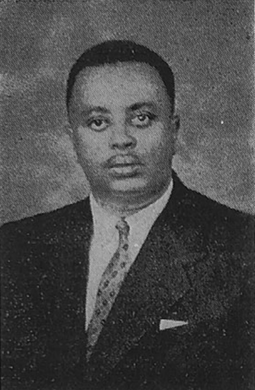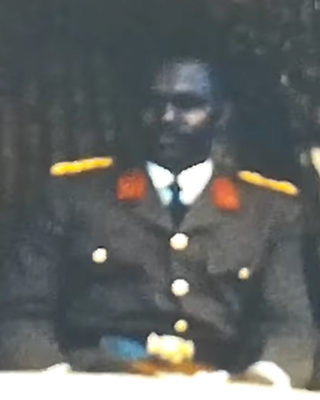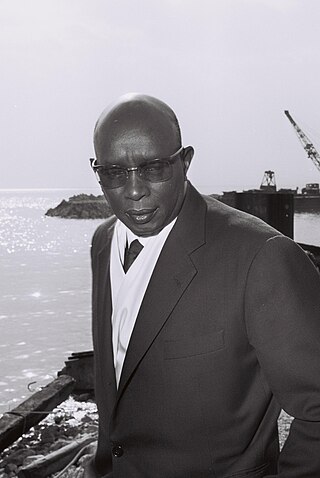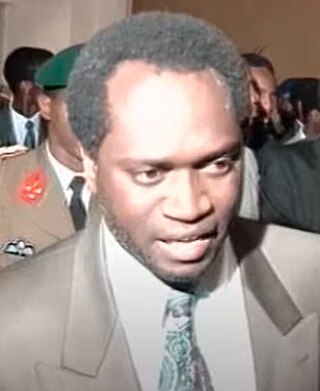Related Research Articles
The BurundiNational Defence Force is the state military organisation responsible for the defence of Burundi.

Burundi originated in the 16th century as a small kingdom in the African Great Lakes region. After European contact, it was united with the Kingdom of Rwanda, becoming the colony of Ruanda-Urundi - first colonised by Germany and then by Belgium. The colony gained independence in 1962, and split once again into Rwanda and Burundi. It is one of the few countries in Africa to be a direct territorial continuation of a pre-colonial era African state.
The Tutsi, also called Watusi, Watutsi or Abatutsi, are an ethnic group of the African Great Lakes region. They are a Bantu-speaking ethnic group and the second largest of three main ethnic groups in Rwanda and Burundi.

Louis Rwagasore was a Burundian prince and politician, who served as the second prime minister of Burundi for two weeks, from 28 September 1961 until his assassination on 13 October 1961. Born to the Ganwa family of Burundian Mwami (king) Mwambutsa IV in Belgian-administered Ruanda-Urundi in 1932, Rwagasore was educated in Burundian Catholic schools before attending university in Belgium. After he returned to Burundi in the mid-1950s he founded a series of cooperatives to economically empower native Burundians and build up his base of political support. The Belgian administration took over the venture, and as a result of the affair his national profile increased and he became a leading figure of the anti-colonial movement.

Michel Micombero was a Burundian politician and army officer who ruled the country as de facto military dictator for the decade between 1966 and 1976. He was the last Prime Minister of the Kingdom of Burundi from July to November 1966, and the first President of the Republic from November 1966 until his overthrow in 1976.

Mwambutsa IV Bangiricenge was the penultimate king of Burundi who ruled between 1915 and 1966. He succeeded to the throne on the death of his father Mutaga IV Mbikije. Born while Burundi was under German colonial rule, Mwambutsa's reign mostly coincided with Belgian colonial rule (1916–62). The Belgians retained the monarchs of both Rwanda and Burundi under the policy of indirect rule.

Pierre Buyoya was a Burundian army officer and politician who served two terms as President of Burundi in 1987 to 1993 and 1996 to 2003. He was the second-longest-serving president in Burundian history.

Melchior Ndadaye was a Burundian banker and politician who became the first democratically elected and first Hutu president of Burundi after winning the landmark 1993 election. Though he attempted to smooth the country's bitter ethnic divide, his reforms antagonised soldiers in the Tutsi-dominated army, and he was assassinated amidst a failed military coup in October 1993, after only three months in office. His assassination sparked an array of brutal tit-for-tat massacres between the Tutsi and Hutu ethnic groups, and ultimately led to the decade-long Burundi Civil War.

Grégoire Kayibanda was a Rwandan politician and revolutionary who was the first elected President of Rwanda from 1962 to 1973. An ethnic Hutu, he was a pioneer of the Rwandan Revolution and led Rwanda's struggle for independence from Belgium, replacing the Tutsi monarchy with a republican form of government. Rwanda became independent from Belgium in 1962, with Kayibanda serving as the country's first president, establishing a pro-Hutu policy and a de facto one-party system governed by his party, Parmehutu. He was overthrown in a coup d'état in 1973 by his defense minister, Juvénal Habyarimana, and died three years later.

Sylvie Kinigi is a Burundian politician and economist who served as prime minister of Burundi from 10 July 1993 to 7 February 1994, and acting president from November 1993 to 5 February 1994, making her the second African woman to serve as a president.

Pierre Nkurunziza was a Burundian politician who served as the ninth president of Burundi for almost 15 years from August 2005 until his death in June 2020.

The Kingdom of Burundi or Kingdom of Urundi was a Bantu kingdom in the modern-day Republic of Burundi. The Ganwa monarchs ruled over both Hutus and Tutsis. Created in the 17th century, the kingdom was preserved under German and Belgian colonial rule in the late 19th and early 20th century and was an independent state between 1962 and 1966.

Burundi, officially the Republic of Burundi, is a landlocked country in the Great Rift Valley at the junction between the African Great Lakes region and East Africa. It is bordered by Rwanda to the north, Tanzania to the east and southeast, and the Democratic Republic of the Congo to the west; Lake Tanganyika lies along its southwestern border. The capital cities are Gitega and Bujumbura, the latter being the country's largest city.

Ethnic groups in Burundi include the three main indigenous groups of Hutu, Tutsi and Twa that have largely been emphasized in the study of the country's history due to their role in shaping it through conflict and consolidation. Burundi's ethnic make-up is similar to that of neighboring Rwanda. Additionally, recent immigration has also contributed to Burundi's ethnic diversity. Throughout the country's history, the relation between the ethnic groups has varied, largely depending on internal political, economic and social factors and also external factors such as colonialism. The pre-colonial era, despite having divisions between the three groups, saw greater ethnic cohesion and fluidity dependent on socioeconomic factors. During the colonial period under German and then Belgian rule, ethnic groups in Burundi experienced greater stratifications and solidification through biological arguments separating the groups and indirect colonial rule that increased group tensions. The post-independence Burundi has experienced recurring inter-ethnic violence especially in the political arena that has, in turn, spilled over to society at large leading to many casualties throughout the decades. The Arusha Agreement served to end the decades-long ethnic tensions, and the Burundian government has stated commitment to creating ethnic cohesion in the country since, yet recent waves of violence and controversies under the Pierre Nkurunziza leadership have worried some experts of potential resurfacing of ethnic violence. Given the changing nature of ethnicity and ethnic relations in the country, many scholars have approached the topic theoretically to come up with primordial, constructivist and mixed arguments or explanations on ethnicity in Burundi.

Mwamikazi Nidi Ririkumutima Bizima Bitazimiza Mwezi was Queen Regent of Burundi from 1908 to her death.

The Ikiza, or the Ubwicanyi (Killings), was a series of mass killings—often characterised as a genocide—which were committed in Burundi in 1972 by the Tutsi-dominated army and government, primarily against educated and elite Hutus who lived in the country. Conservative estimates place the death toll of the event between 100,000 and 150,000 killed, while some estimates of the death toll go as high as 300,000.

On 21 October 1993, a coup was attempted in Burundi by a Tutsi–dominated army faction. The coup attempt resulted in assassination of Hutu President Melchior Ndadaye and the deaths of other officials in the constitutional line of presidential succession. François Ngeze was presented as the new President of Burundi by the army, but the coup failed under domestic and international pressure, leaving Prime Minister Sylvie Kinigi in charge of the government.
Marie-Louise Sibazuri is a Burundian women's rights activist and teacher who has devoted her time to writing since 1993. In addition to becoming a prolific playwright, she is widely known as the author of the popular radio series Umumbanyi Niwe Muryango, a soap opera which sets out to improve relations between Tutsis and Hutus following the conflicts of the mid-1990s. After spending several years in Belgium where she was active in the theatre, she has now moved to Australia with her second husband, Hilaire Bucumi. She is currently writing collections of Burundian folk tales.
Eustache Ngabisha was a Burundian politician, and the father of Burundian president Pierre Nkurunziza.
Pierre Baranyanka was a Burundian chief and historian.
References
- ↑ Akyeampong, Emmanuel Kwaku; Gates, Henry Louis (eds.). Dictionary of African Biography. p. 156.
- ↑ Chrétien, Jean-Pierre (1970). "Une révolte au Burundi en 1934". Annales. Économies, Sociétés, Civilisations. 25 (6): 1683, 1700.
- ↑ Akyeampong, Emmanuel Kwaku; Gates, Henry Louis (eds.). Dictionary of African Biography. p. 157.
- ↑ Lemarchand, Rene. Burundi: Ethnic Conflict and Genocide. p. 46.